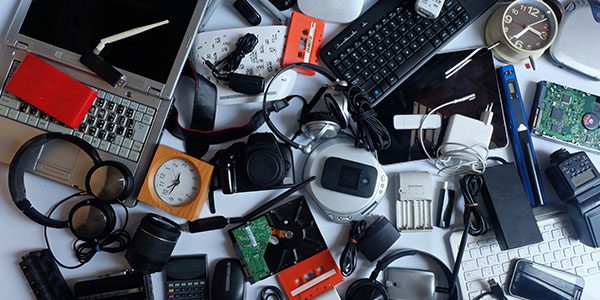Dependable Electronic Devices Recycling Solutions: R2 Certification Establishes the Standard
Dependable Electronic Devices Recycling Solutions: R2 Certification Establishes the Standard
Blog Article
Elevate Your E-Waste Monitoring With R2 Certification: a Comprehensive Introduction
One key method to elevate e-waste monitoring practices is by acquiring R2 accreditation. By discovering the benefits and processes connected with R2 accreditation, a much deeper understanding of how it can reinvent e-waste management strategies emerges, shedding light on a course in the direction of sustainability and honest disposal techniques.
Importance of E-Waste Monitoring

When e-waste is not managed properly, these hazardous substances can seep right into the community, creating injury to wildlife and possibly getting in the food cycle, posturing dangers to human wellness. The improper disposal of e-waste contributes to contamination and greenhouse gas exhausts, exacerbating environment modification and ecological deterioration.

Advantages of R2 Accreditation

Firstly, R2 qualification improves reputation by showcasing a company's dedication to sustainable methods. It ensures consumers, partners, and stakeholders that the firm complies with rigid requirements for e-waste management - r2 certification. This credibility can bring about boosted count on and enhanced partnerships with customers who prioritize environmental duty
Secondly, R2 certification assists alleviate threats linked with incorrect e-waste disposal. By adhering to the strict standards stated by the certification, companies can decrease the possibility of information violations, environmental contamination, and lawful repercussions. This positive technique safeguards the firm's track record and reduces possible responsibilities.
Last but not least, R2 accreditation demonstrates a commitment to environmental stewardship - r2 certification. By sensibly managing electronic waste via accredited processes, companies contribute to the preservation of resources, decrease of contamination, and promo of a circular economy. This commitment not just profits the setting but likewise lines up with advancing consumer assumptions for sustainable company techniques
R2 Certification Refine Introduction
Having established the advantages of R2 certification in promoting integrity, risk reduction, and environmental stewardship, it is essential to now describe the thorough procedure involved in acquiring this qualification. The R2 qualification procedure begins with an extensive testimonial of the company's operational plans and procedures to make certain conformity with the R2 requirement. This first evaluation is vital in recognizing any kind of gaps that require to be addressed prior to continuing even more.
Once the company's techniques straighten with the R2 typical needs, an independent third-party auditor conducts an on-site audit to examine the application and performance of these methods. This audit includes a detailed evaluation of documents, interviews with personnel, and physical evaluations of facilities to verify compliance.
Following a successful audit, the company receives a certification decision based upon the auditor's searchings for. If approved, the company is provided R2 qualification, demonstrating its commitment to accountable e-waste management. It is very important to note that preserving R2 certification needs recurring conformity with the requirement's try this website needs and periodic audits to make certain ongoing adherence to finest methods in e-waste recycling and disposal.
Secret Criteria for R2 Conformity
A necessary aspect of accomplishing R2 conformity is guaranteeing that all electronic waste (e-waste) processing centers satisfy rigorous ecological and safety and security standards. To adhere to R2 needs, companies must stick to vital criteria that concentrate on liable e-waste administration techniques. These requirements include implementing a recorded environmental, health, and security administration system, making sure the protected handling of data-containing tools, and performing comprehensive downstream due diligence to track the final destination of e-waste products.
Furthermore, R2 compliance requires the proper testing, refurbishment, and recycling of electronic devices to expand its beneficial life and decrease ecological influence. Facilities looking for R2 accreditation must also prioritize employee health and wellness by giving essential training, individual protective equipment, and a secure workplace. In addition, maintaining thorough documents of e-waste handling activities and on a regular basis undergoing audits by certified certifying bodies are essential elements of demonstrating ongoing compliance with R2 requirements.
Impacts of Sustainable E-Waste Practices
The implementation of lasting e-waste techniques in conformity with R2 conformity not only makes sure environmental and security criteria are met however also significantly impacts the total lifecycle of electronic items. By sticking to R2 criteria, digital waste administration procedures come to be find out here now much more reliable, lowering the ecological impact of digital items. Sustainable e-waste methods help with the correct disposal of digital components, making sure that unsafe materials are managed properly and do not wind up contaminating the atmosphere.
Additionally, sustainable e-waste practices can contribute to work production in the recycling and repair industries, promoting economic growth while promoting environmental responsibility. In general, the fostering of sustainable e-waste methods under R2 qualification serves as a vital step in the direction of achieving an extra ecologically lasting electronics market.
Verdict
In verdict, executing proper e-waste management methods is critical for ecological sustainability and source preservation. R2 qualification plays a vital role in guaranteeing accountable handling and disposal of digital waste. By adhering to the rigid standards set forth by R2 criteria, organizations can not just decrease their environmental impact yet also add to a more lasting future for generations ahead.
One trick approach to elevate e-waste monitoring practices is by attaining R2 certification. By checking out the processes and benefits connected with R2 qualification, a deeper understanding of how it can reinvent e-waste monitoring methods emerges, shedding light on a course towards sustainability and ethical disposal practices.
The R2 accreditation process starts with a complete review of the company's functional plans and procedures to make sure compliance with the R2 standard. If accepted, the organization is granted R2 qualification, demonstrating its commitment to responsible e-waste management. On the whole, the adoption of lasting e-waste practices under R2 accreditation offers as a critical her latest blog step towards accomplishing a much more ecologically sustainable electronic devices sector.
Report this page